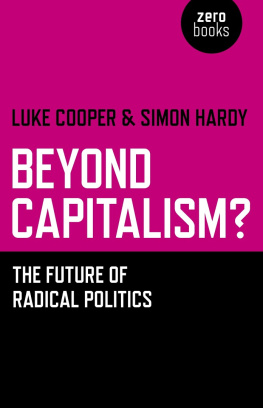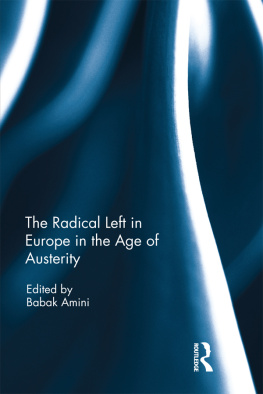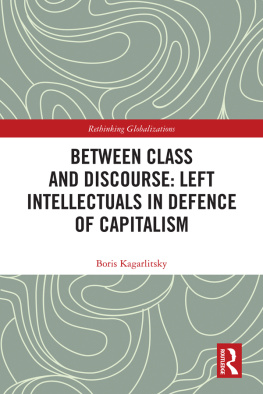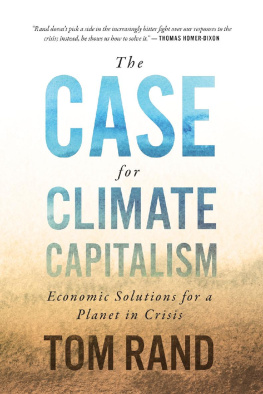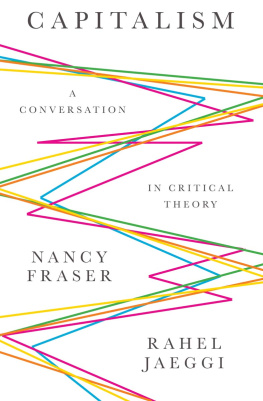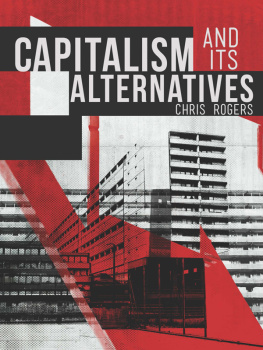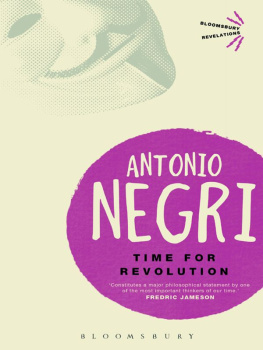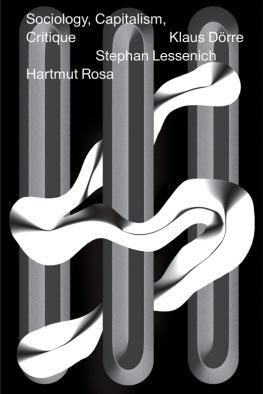Beyond Capitalism?
The Future of Radical Politics
Luke Cooper & Simon Hardy

Winchester, UK
Washington, USA
First published by Zero Books, 2012
Zero Books is an imprint of John Hunt Publishing Ltd., Laurel House, Station Approach, Alresford, Hants, SO24 9JH, UK
office1@jhpbooks.net
www.johnhuntpublishing.com
www.zero-books.net
For distributor details and how to order please visit the Ordering section on our website.
Text copyright: Luke Cooper and Simon Hardy 2012
ISBN: 978 1 78099 832 9
All rights reserved. Except for brief quotations in critical articles or reviews, no part of this book may be reproduced in any manner without prior written permission from the publishers.
The rights of Luke Cooper and Simon Hardy as authors have been asserted in accordance with the Copyright, Designs and Patents Act 1988.
A CIP catalogue record for this book is available from the British Library.
Design: Stuart Davies
Printed and bound by CPI Group (UK) Ltd, Croydon, CR0 4YY
We operate a distinctive and ethical publishing philosophy in all areas of our business, from our global network of authors to production and worldwide distribution.
CONTENTS
Thanks to friends and comrades for their inspiration and help with this book
Come, my friends,
Tis not too late to seek a newer world.
Ulysses by Alfred Tennyson
Challenges for a new left
Has capitalism lost its capacity for internal renewal to reform under the pressures of its own crises and antagonisms? Speaking back in 1996 on his book, The Future of Capitalism, Lester Thurow reflected on how social progress had been achieved in the 20th century. He anticipated that the decline of left wing politics would prove to be a problem for capitalism:
What does a society do when problems start emerging, like falling wages in the United States, yet nobody has any idea about the alternative [to the status quo]? Suppose you didnt believe in capitalism, well what do you believe in? The answer is you wouldnt have anything to believe in anymore. And that means the dominant system, capitalism, loses the ability to reform itself. [Because]... if you look at the reforms made to capitalism over the last hundred and forty years, things like pensions, healthcare, unemployment insurance, they were all done under the pressure of socialists who said if you dont do this were going to take over , whereas there is no one about to take over anymore.
If we look at the reactions of global elites to the financial crisis since the collapse of Lehman Brothers, we can see visibly how Thurows prophecy has been realised. Today, capitalism lacks an other in the sense of an opposition that it could define itself in relation to and which could, in turn, by appearing to threaten the systems existence, compel ruling elites to reform and attempt to overcome the internal contradictions of the system. Thurows argument remains powerful because it begs the question: what will capitalism look like as a system when it is left to its own devices, when it assumes such a degree of political authority that the cultural condition of humanity becomes ever more capitalistic? At times over the last decades capitalist ideology had its own utopia i.e. an idealised vision of the market-driven and technologically-refined society that globalisation was pushing us towards but since the financial crisis it has lacked this certainty about the future it is creating.
At the same time, a credible left wing politics has also not emerged that might compel ruling elites to reform, in the manner that Thurow described occurring in the 20th century. This seemingly post-utopian conjuncture poses challenges to those who still argue for going beyond capitalism. For radical leftists that believe there is indeed an alternative, the challenge is how do we make this idea credible again? And even if it does become credible once more, how can we stop capitalism from incorporating aspects of our project into its own reproduction as a profit- driven system? The capitalist crisis poses profound questions about the future of left wing politics because of its sheer depth and severity. When leading establishment think tanks anticipate decades of austerity will be the norm in a number of western countries, then it brings to light the epochal nature of the current crisis of how the changes which are forged out of this cauldron of discontent will determine the future for a much longer period ahead. While the longevity of the crisis underlines the scope for preparation and the gradual marshalling of support amongst wider layers of working class people, the crisis nonetheless still poses sharply the if not now then when? question for anticapitalist and socialist activists. After all, in these conditions radical political ideas should be striking a chord amongst millions of workers and, if they are not, then we have to look hard at ourselves. We have written this book as activists in the movement who want to reappraise some of the historical problems of the left in light of the transformations the world has undergone over the last three decades. Two themes occupy our attention in what follows. Firstly, we discuss the evolution of political life since the 1970s and the fate of the radical left after the neoliberal revolution. In most countries in the world not only is acceptance of capitalism fundamental to the assumptions of the major political parties, but a specific variant of neoliberal ideology has come to be seen as the exclusive road down which politics must travel. Of course there are variations and differences - we do not want at all to deny the fact that world capitalism remains a mosaic of enormous variety. Indeed, we admit that much of the narrative we tell might be based on a specific set of experiences in Anglo-American politics. But we do nonetheless believe there are general problems for the left in the post-1989 world, which we have to grapple with and understand if we are to find a way forward.
The second theme of our book might appear more distant and more abstract, yet it cuts to the core of how political struggle and resistance is formed today. How do we move beyond capitalism? Or, even, whether it is possible to move beyond capitalism? How we choose to answer these questions has strategic consequences. Historically, most discussion on the radical left deals with this second question and explores a spectrum of possibilities. If we consider the programmes that emerged in the post-war period until the 1980s, then there were several specific strategies which were each in their own way considered by large numbers of people to be a viable means through which capitalism could ultimately be transcended: parliamentary reformism, peasant insurrection, Autonomism and urban guerrilla-ism, and a party- led working class insurrection la the October Revolution.
While these movements were diverse and each ideology gained a foothold amongst sections of society at different points in space and time they each contributed to the general conception of the 20th century as a great tussle between capitalism and its left-modernist challengers. The post-1989 world is strikingly different in this regard, and so, to speak of radical change at all, almost recalls a bygone age. An elephant in the room problem so often occluded or just downplayed in left wing discussion that imposes itself on activists, is that to arrive at a conjuncture where anticapitalist strategies can be implemented will require an extraordinary transformation in the consciousness of millions.
The gap between where we are and where we want to be is the basic problematic of left politics today. Once you get passed the optimistic rhetoric of the left, the fear that lingers behind the scenes is whether we can overcome the radical disjuncture between our political aspirations and the degree of support in the working class that genuine revolutionary change requires. This problem is not entirely novel, because of the first of our questions how we analyse society has always informed perspectives on how to change it. Many radicals in the 1960s responded to an apparent decline in left wing radicalism by searching out new revolutionary subjects beyond the working class as it was traditionally understood. Bold and imaginative as these endeavours often were, they failed to build movements that had the social power to realise the anti-systemic goals they held to. In their impatience they tended to isolate the most radical from orgainsed labour and so allowed its reformist ethos to go relatively unchallenged. But they nonetheless emerged out of a real problem: bureaucratisation had rendered the labour movement passive and conservative.
Next page
